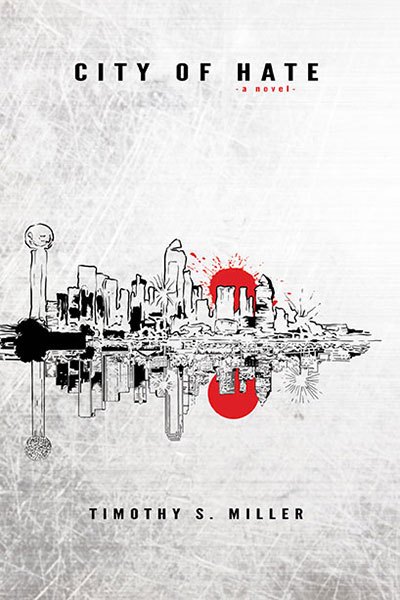Filling the Void: A Review of Timothy S. Miller’s ‘City of Hate’
By Allison Wall
Posted on

The City of Hate, the city that titles Timothy S. Miller’s forthcoming novel, is Dallas. It’s a relatively modern version. Dealey Plaza buzzes with tourists come to see the Sixth Floor Museum and relive the events of President Kennedy’s assassination, but this Dallas still has answering machines, printed glossy photographs, and storefront bookstores as (mostly) viable business models. More striking, though, is the emptiness within this busy, thriving city. It’s not the buzzing, numb kind of empty, but an emptiness that writhes and howls and demands to be filled.
We walk the streets of Dallas in the shoes of Hal Scott, a cynical, triggered alcoholic clinging to sobriety by his fingernails. Hal, himself empty, fills up his inner monologue with paranoid speculations of other people’s lives. But his perspective isn’t sound. Sometimes, it causes him to miss the truths/connections right in front of him. Sometimes, it’s as if he wants to miss them. We go with him to AA meetings and see other empty people who tried to fill their own voids with alcohol. It doesn’t work.
Neither does sex, though plenty try that, too, from the upper echelons of political power to the seedy hotels where prostitutes turn tricks for $10. But when your sexual partner is also an empty shell, there’s no real chance of emotional intimacy. There’s no one to get to know. Sex is nothing more than a momentary distraction from the reality of the void.
Others try conspiracy theories. They think, maybe there’s more to this. Maybe there’s a reason we’re drowning in emptiness. Maybe someone is manipulating this situation. Lemon, the self-proclaimed bastard son of Lee Harvey Oswald, buries himself deep. And when Hal finds himself embroiled in a real-life conspiracy that threatens his life, he reluctantly goes with Lemon down a rabbit hole he neither expects nor wants. But there’s no relief there, either. Dallas itself is hollow.
Its buildings are empty, wishing its workers would work around the clock, wishing that its insides were vibrating with the travel of leather and high heels. Its elevators should be pulsing with the silent breath of passengers avoiding eye contact, looking at their watches, staring at their shoes, watching their mobile phones. These buildings wish they could be utilized around the clock, wish they could be utilized for more than this nine-to-five monotony. (Miller 75)
The pervasive emptiness and alienation within this modern city feel too real, and distressingly familiar. Which of us twenty-first-century city creatures hasn’t felt alone in a sea of cars during rush hour? Who hasn’t felt the separateness of their single soul within a crush of people?
Timothy S. Miller has. He knows how we feel. Through Hal, he commiserates with us and pours out a potent cocktail of human emotions, reactions to modern life in a modern city. Most of it is relatable, not the least of which is Hal’s rage against a political system set up by the wealthy, for the wealthy, or for corrupt politicians who do what the wealthy demand. “So, short of total anarchy—short of a total revolution—our hands are tied” (Miller 135). That sense of political trapped-ness is very on point in 2020 America.
All of Miller’s characters feel raw, real, and desperate. Everything is dense with emotion, and the stakes are high for all. Hal runs from one kind of emptiness to another, through a tangled web of conspiracy, misinformation, and danger, to what might be a kind of redemption, but at the very least is a confrontation of his past, a recognition of his own emptiness, his failure to fill it, and a willingness to surrender.
Readers may demand, “Is this how we fill the void? Stop running and trying to fill it, and face it?”
Miller doesn’t offer any solution, but that’s fine. The job of a novel isn’t to solve. We open the pages of a book to experience, to feel and to feel connected, to affirm that we aren’t the only ones screaming into the void of existence. In this, Miller is successful. City of Hate doesn’t have answers, but it’s a hell of a ride, and a confirmation that you, reader, are at least not alone.
– Allison Wall